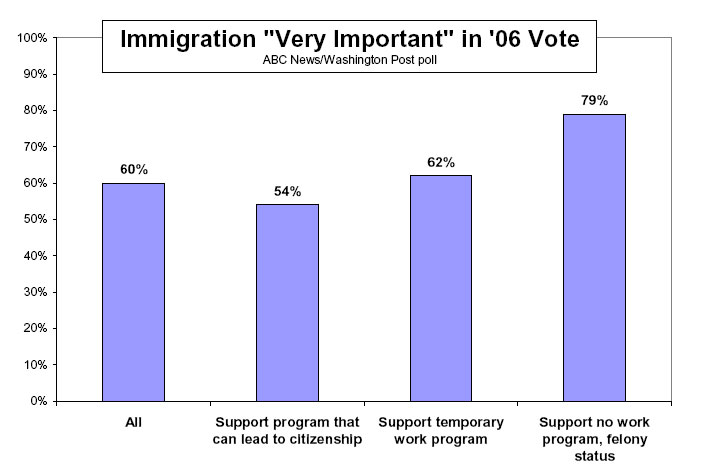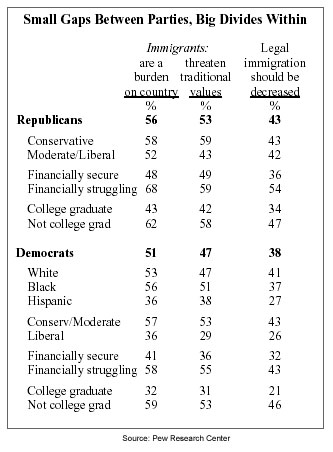Gallup brings us the polling story of the day with a report of a “significant” increase in the percentage of Americans who consider immigration and gasoline prices the most important issues facing the country. Gallup reports that mentions of immigration on this open-ended quesiton (in which respondents answer in their own words) have increased from 6% in March to 19% in April. Only Iraq ranks higher at 25% (up slightly from 20% in March). Mentions of fuel and oil prices have increased from 5% to 11%. A complete analysis of these data by Gallup’s Jeffrey Jones is available to non-subscribers for today only.
Note what Jones has to say about how the results vary by party identification:
Democrats and Republicans disagree over the nation’s top problem. For Democrats, it is Iraq. Thirty percent say so, compared with 21% of independents and 15% of Republicans. Among Republicans, immigration is seen as the most pressing concern. Thirty percent of Republicans cite immigration as the most important problem, compared with 16% of independents and 11% of Democrats.
A Gallup analysis from just two weeks ago (now available to subscribers only) pooled data for this question from the first three months of 2006. It found a similar pattern. Only 4% of Americans named immigration as the most important problem, although mentions were more frequent among Republicans (6%) and independents (5%) than among Democrats (2%).
In the first quarter of 2006, Gallup also found that Democrats were more likely to mention Iraq (31%), general dissatisfaction with government (8%) and unemployment and jobs (5%) as the most important problems. Republicans were more likely to mention terrorism (14%), ethics and morality (9%), national security (6%) and again, immigration (6%).
UPDATE: In the comments, Tom Riehle reminds us that the most recent AP/IPSOS poll showed a similar result. Open-ended mentions of immigration increased from 3% to 13% from January to April.
UPDATE II: Results from the surveys released today by the Pew Research Center and Harris Interactive also confirm the trend. Harris shows immigration increasing from 4% to 19% between March and April as the most important problem. Pew shows an increase from 1% to 15% between March and April in the percentage who name immigration or border issues as the “FIRST news story that comes to mind when you think about what’s been in the news lately.”
UPDATE III: In the comments section, Andrew Tyndall speculates that the increased salience may be coming from those who fear “legislation may turn many immigrants into criminals, prohibit social services from helping them and obstruct plans to grant a path to citizenship.” While we lack data directly on point, the fact that salience tends to be higher among Republicans than Democrats tends to undermine his argument. We could evaluate this hypothesis directly with a cross-tabulation of any of the “most important problem” questions above by attitudes on immigration. Unfortunately, as far as I can see, none of the releases do so.
However, ABC News provided something pretty close in a news release on April 9 (that uncharacteristically does not appear in their “Poll Vault” web page — though you can see the text of the questions via the Washington Post). The ABC release included a chart (reproduced below) that showed those with “less tolerant views” on immigration – chiefly Republicans and conservatives” tended to rate immigration as most important to their Congressional vote:
Among the nearly two-thirds who favor [a program that would lead to citizenship], 54 percent say it’ll be a very important issue in their vote, comparatively few. Among those who favor a temporary guest worker program, more, 62 percent, call it very important. And among those who favor felony status for immigrants with no work program – disproportionately Republicans and conservatives – far more, 79 percent, call it a top issue in their vote.

But be careful of jumping to the conclusion that an anti-immigrant policy rallies all of the GOP base. The Pew Research Center has presented strong evidence that attitudes on immigration tend to divide key coalitions within both parties. Check their Political Typology report from 2005 and their mega-immigration report released a few weeks ago (especially the table reproduced below). They show that opposition to immigration tends to be greatest among social conservative and less-well educated Republicans, but that upscale, well-educated, pro-business Republicans tend to be more ambivalent. A similar divide separates well educated Liberals (who tend to be most pro-immigration) from more downscale, African American or moderate Democrats.

The AP poll two weeks ago detected the exact same increase on its own “most important problem” open end.
http://seattlepi.nwsource.com/national/1110AP_Top_Problems_Poll_Method.html
In the wake of the recent mass protests, the keyword “immigration” may signify two diametrically opposite concerns:
1)That lax border controls mean there are too many immigrants working in this country who arrived illegally and that uncontroled entry into this country poses a security risk.
2)That pending legislation may turn many immigrants into criminals, prohibit social services from helping them and obstruct plans to grant a path to citizenship.
Based on levels of news coverage and the intensity of political debate, the latter concern has grown from invisible to prominent in the past couple of months; the former concern has shown no such increase.
The Mystery Pollster is probably correct to throw cold water on my hypothesis. Gallup says it polled “Americans” (who knows if that includes immigrants, with green cards or without them). Those whose concern about “immigration” in an open-ended question refers to fear of a nativist backlash are likely to be friends, neighbors, kin and colleagues of would-be Americans (those seeking “amnesty” aka a “path to citizenship”) rather than Americans full-blown.
Let me offer two points of caution, however:
First, the recent headline-grabbing mass demonstrations in favor of a path to citizenship and the Senate committee votes in opposition to the House legislation are late developments in the January-through-April timeframe during which “immigration” as a general category gained in saliency. On the network nightly newscasts, immigration was ranked Story of the Week in the final week of March and was ranked #2 in the second week of April. When Pew measures “immigration” as the “first story that comes to mind” in its April polling, it is undoubtedly referring to the coverage of those, pro-immigrant, events (including, of course, negative reaction to those events from the likes of CNN’s Lou Dobbs and FNC’s Bill O’Reilly), rather than last year’s anti-illegal-immigration coverage of the Minutemen, the border fence and the punitive House bill.
Second, about the concentration of this issue among Republicans rather than Democrats. Politically speaking, immigration is a big deal among Republicans quite apart from its importance as a public policy question. President Bush and Senator McCain both repudiate the party’s nativist wing. Its stellar efforts in 2004 to make inroads among Mexican-Americans and other Hispanic-heritage voters may be unraveled by this issue (see Pete Wilson and Prop 187). The outreach by conservative Evangelical Christians to conservative Catholics on such issues as abortion and homosexuality founders on the issue of immigration. The Roman Catholic Church is categorically pro-immigrant, as is symbolized by the leadership of Irish-American Democrats and clergy on this issue. For Catholics, the distinction between legal and illegal immigration is a technicality.
It may be that for Republicans “immigration” is a serious issue because it is the cause of political controversy and divided loyalties as much as because the Grand Old Party is, in its core beliefs, nativist.
MANY HISPANICS OPPOSE ILLEGAL IMMIGRATION BOYCOTT
by MONTANA NEWS ASSOCIATION
by Jim Kouri, CPP
Saturday April 29, 2006
Recent nationwide street demonstrations by illegal aliens and their supporters, demanding amnesty for 12 million or more illegal immigrants, have been portrayed in the media as representing the views of all Hispanics in the US
However, according to opinion polls, including one conducted by the Pew Hispanic Center, Americans are divided on the issue with 53% saying that people who are in the US illegally should be required to go home. According to the Pew Study, a growing number also believe that illegal immigrants are a burden to the country, taking jobs and housing and creating strains on the health care system.
These facts reflect the position of many Hispanic-Americans — citizens, legal immigrants and the children of immigrants — who strongly oppose amnesty for illegal aliens and support enforcement of US immigration laws.
In response to the hundreds of thousands of illegal aliens who have been marching under the Mexican flag demanding to be rewarded for having violated US mmigration law, a new coalition has been formed to accurately represent Hispanics in the US who work hard, play by the rules and want the opportunity to see their own kids get ahead. Known as “You Don’t Speak for Me,” the coalition aims to dispel the impression that the people out on the streets represent the views of all Hispanic-Americans.
“Politicians and the media seem to believe that Hispanic-Americans hold a monolithic view on the subject of immigration,” said Peter Nunez, a former Assistant Secretary of the Treasury and a spokesman for the group.
“In fact, millions of Hispanic-Americans — including many who have gone through the immigration process the right way — are offended by the demands being made by people who have broken our nation’s laws. We are even more offended that the views of Hispanic citizens are not being accurately portrayed,” he said.
The “You Don’t Speak for Me” coalition supports the strengthening and enforcement of US immigration laws, including manpower and barriers along the US-Mexico border, denial of non-emergency benefits and services to people who are in the country illegally, and vigorous enforcement against businesses that hire illegal aliens.
“Hispanic-Americans are often the people who are harmed the most by our government’s failure to enforce our immigration laws,” Nunez said.
“More often than not, it’s our jobs, our social services, and the education of our children that are most adversely affected by illegal immigration. A massive illegal alien amnesty, with millions more relatives being allowed to enter the country, followed by what will likely be an even greater wave of illegal immigration will de devastating to the country and particularly to Hispanic citizens.”
With another round of illegal immigrant demonstrations scheduled for May 1, “You Don’t Speak for Me” is urging the media to portray fairly the views of Hispanic-Americans on this issue. “You Don’t Speak for Me” spokespeople around the nation are available to speak to the media to present a balanced picture of Hispanic-American views on illegal immigration and amnesty for illegal aliens.
http://www.montanasnews.com